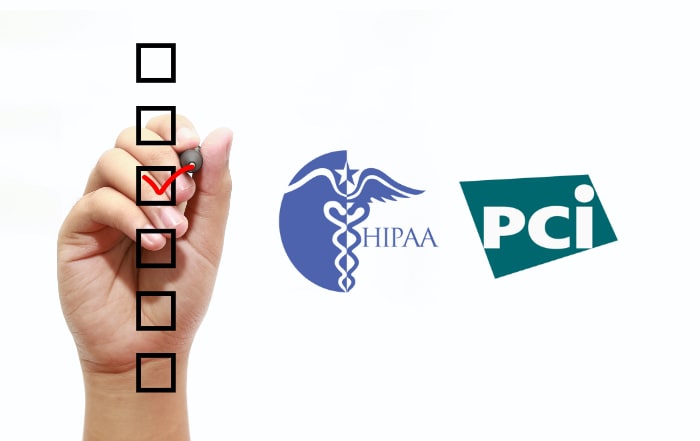In today’s business landscape, data management, storage, and protection should be a crucial part of any company’s strategy. This especially applies to healthcare companies and businesses that process credit card payments because they’re governed by industry-specific security standards. The compliance standards that govern how these organizations should secure their data are the Health Insurance Portability and Accountability Act (HIPAA) and the Payment Card Industry Data Security Standard (PCI DSS).
HIPAA has broad requirements concerned with protecting the privacy and integrity of protected health information (PHI) and electronic health records (EHR). Meanwhile, PCI DSS has an explicit set of guidelines that focus on safeguarding payment card data.
Since payment processing via credit card is commonplace in the healthcare industry, organizations in Chicago, Tampa, and the wider United States may be subjected to both HIPAA and PCI DSS. While both standards should be treated as separate compliance efforts, there are many areas where PCI DSS and HIPAA requirements overlap. If you run a healthcare organization that has access to and manages PHI, EHR, and credit card data, following the tips below can help you achieve and maintain compliance.
Build secure networks and systems
Both HIPAA- and PCI DSS-covered businesses must deploy appropriate security measures to defend against data breaches. Although HIPAA doesn’t stipulate the types of defenses required, PCI-recommended security solutions are great for minimizing cyber risk.
Next-gen firewalls and secure web gateways stop malicious traffic and software from reaching your systems. Should hackers manage to circumvent these, you must have anti-malware and endpoint management software like Sophos Central Device Encryption in place to secure the devices that store PHI and credit card information. Company and security software must also be regularly updated so they can always defend against the latest and most sophisticated attacks.
More importantly, make sure to avoid using vendor-supplied default passwords and configurations on your routers, devices, and security software. Failure to do so can give hackers easy access to your data.
Encrypt sensitive data
One of the core requirements of PCI compliance is to encrypt cardholder data at rest and in transit. The same requirement also applies to HIPAA compliance when it comes to securing the confidentiality and integrity of medical records.
Encryption essentially converts files into indecipherable code that can only be read by authorized accounts and devices. If hackers manage to intercept encrypted data being transmitted across a network, they won’t be able to glean any useful information for fraudulent activities.
Regardless of which compliance initiative your organization falls under, it’s important that any device, server, or network that stores and has access to sensitive data is fully encrypted. Deploying 256-bit advanced encryption systems makes it so that even the strongest supercomputers will take millions of years to crack the code and gain access to your data.
Additionally, everyone should connect to a virtual private network (VPN) when they’re processing PHI or cardholder data, especially when they’re using open public Wi-Fi networks. That’s because VPNs create an encrypted connection between your device and the internet, masking your internet protocol (IP) address, browsing history, and any data you transmit through a network. This prevents hackers from tracking your web activity and intercepting sensitive information.
Set strong user authentication and access restrictions
To prevent data breaches, users should have minimum necessary standard access to credit card information and health records. Achieving this in the context of PCI and HIPAA involves various strategies.
For starters, employees must set at least a 12-character password that’s unique to each account that has access to PHI or credit card information. Enabling multifactor authentication is also critical here in case passwords are compromised.
Another step to protecting classified data is using system administration software to limit access to company systems based on job roles, location, and device. This way, no one in the company can stumble into private records, nor can they access them if they’re using an unsafe device or if they’re connected to unsecured public Wi-Fi networks. These restrictions also reduce the risk of someone in a public area sneaking a peek at PHI and credit card information displayed on an unattended computer or mobile device.
Develop and maintain an information security policy
Relying solely on technical security measures won’t guarantee compliance with both PCI DSS and HIPAA. The people who handle PHI or cardholder data must also adhere to cybersecurity best practices.
That’s why you need an information security policy that advises users on how to keep sensitive information out of harm’s way. Your policy should cover procedures on identifying and avoiding phishing scams, defending against device theft, setting strong passwords for user accounts, and only accessing PHI or credit card information in secure locations and private networks. Your business must also schedule regular password resets to prevent old passwords from being used and cracked. What’s more, the information policy should outline the penalties for unauthorized disclosure or breach of classified data, whether it’s done accidentally or deliberately.
Of course, for these policies to sink in, you must provide regular security training to those responsible for credit card processing and PHI records. An effective way to train your employees is to supplement lecture-style courses with practical exercises and simulated cyberattacks.
Routinely evaluate security measures
Every organization must regularly review their cybersecurity framework for any weaknesses if they’re to keep data safe and meet ever-changing compliance regulations. This involves conducting quarterly or even monthly vulnerability scans of networks, servers, internet-connected devices, and software. Plus, companies need to review their employees’ security awareness through simulated security exercises.
With these assessments, you’ll have a firm grasp of your company’s overall risk exposure before the cybercriminals do and make smarter decisions to address the issue. For instance, if your business is susceptible to malware, you’ll have to reevaluate your patch management policies and opt for proactive network monitoring services. On the other hand, if employees’ poor cyber hygiene is your problem, you may need to improve your security training program.
Whatever regulations govern your business, taking a methodical approach to cybersecurity and compliance can help you avoid disastrous outcomes for your organization and ensure that you keep your clients’ trust.
Related reading: Can healthcare staff work remotely and stay HIPAA-compliant?
Contact our team for a free compliance and IT consultation
If you’re having trouble meeting the necessary compliance requirements, Dynamics Solutions Group is here to support you. From comprehensive risk assessments and cybersecurity solutions to compliance management and security training, we have the services your organization needs to simplify compliance and reduce risk. Contact us today to streamline HIPAA and PCI DSS compliance.






